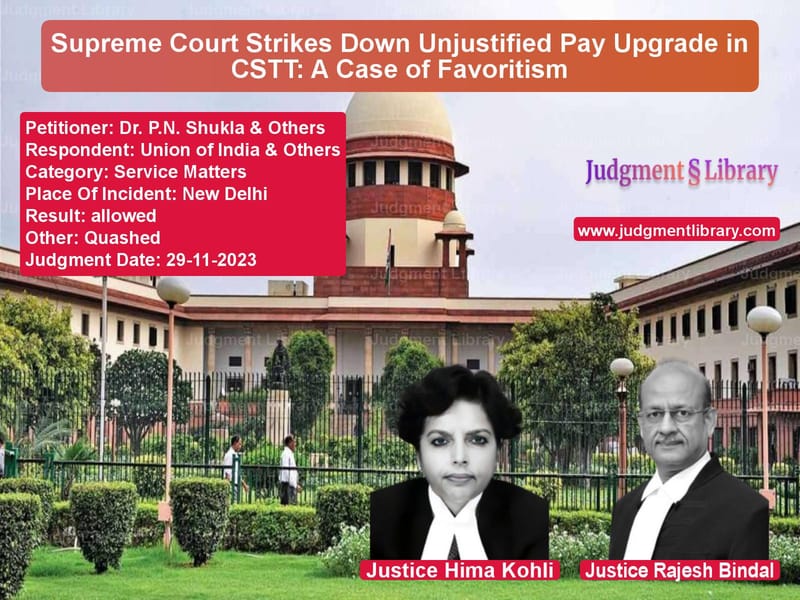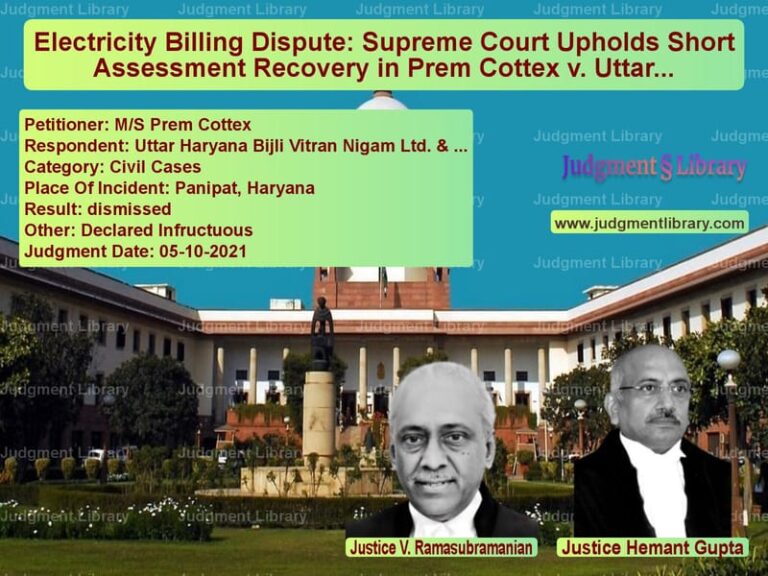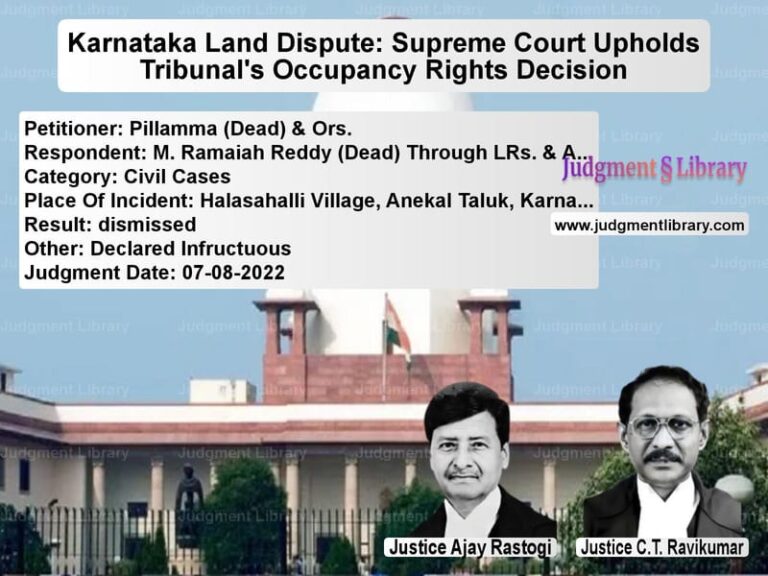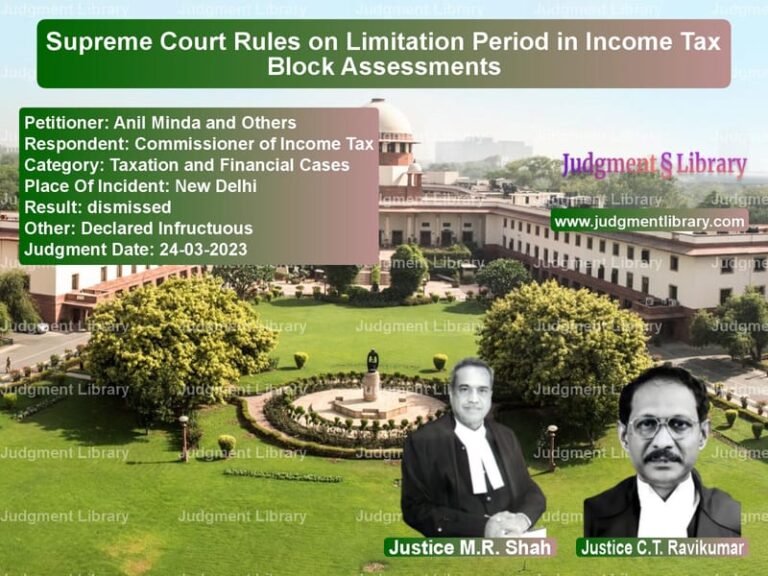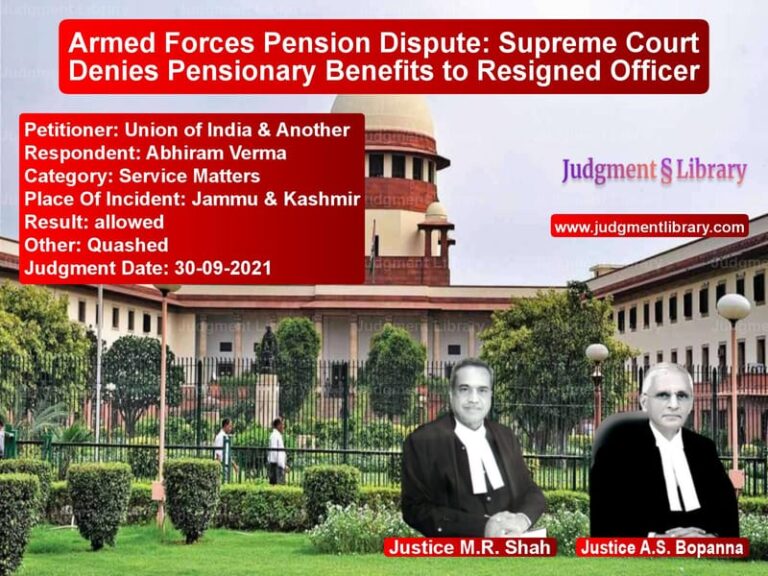Supreme Court Strikes Down Unjustified Pay Upgrade in CSTT: A Case of Favoritism
The Supreme Court of India recently ruled in Dr. P.N. Shukla and Others v. Union of India and Others, addressing the issue of unjustified pay upgrades and favoritism in the Commission for Scientific and Technical Terminology (CSTT). The case involved the illegal grant of a higher pay scale and benefits to one officer while denying the same to others in the same cadre.
Background of the Case
The case arose from the appointment and promotion of officers in CSTT. The appellant, Dr. P.N. Shukla, along with others, was recruited as a Research Assistant (later re-designated as Assistant Scientific Officer) under the Central Hindi Directorate Recruitment Rules, 1980. The respondent, Dr. BhimSen Behera, was also recruited under the same rules but later granted a higher pay scale with non-practicing allowance (NPA), which led to disputes over fairness and equal pay.
Key Legal Issues
- Whether the higher pay scale and NPA granted to Dr. Behera was legally justified.
- Whether CSTT had the authority to declare an officer’s post ex-cadre without due process.
- Whether the denial of equal pay to similarly placed officers violated the principles of fairness and equality.
- Whether the authorities were guilty of favoritism and manipulation in granting undue benefits.
Arguments by the Appellants (Dr. P.N. Shukla & Others)
The appellants contended:
- They were recruited under the same rules as Dr. Behera and performed the same duties.
- Dr. Behera’s post was wrongly upgraded, and his pay was increased based on an incorrect interpretation of the Pay Commission’s recommendations.
- Declaring Dr. Behera’s position as ex-cadre after granting him a higher pay scale was a move to cover up an earlier illegal act.
- The CSTT’s actions were arbitrary and amounted to favoritism.
Arguments by the Respondents (Union of India & Dr. BhimSen Behera)
The respondents argued:
- Dr. Behera had a professional degree in Ayurveda, unlike other Assistant Scientific Officers.
- The Pay Commission’s recommendations justified granting him parity with doctors in the Indian Systems of Medicine.
- The government’s decision to declare his post ex-cadre was legitimate.
- The appellants had no legal right to challenge the pay upgrade of another officer.
Supreme Court’s Analysis
1. Violation of Pay Commission Guidelines
The Court found that the Fifth Central Pay Commission’s recommendations were misapplied. The relevant provision pertained to medical officers in clinical roles, whereas Dr. Behera was engaged in academic terminology work.
“Granting NPA and a higher pay scale to a non-clinical officer was erroneous and unsustainable in law.”
2. Arbitrary Declaration of Ex-Cadre Post
The Court criticized CSTT’s decision to retroactively declare Dr. Behera’s post ex-cadre after granting him undue benefits.
“The decision to declare a post ex-cadre must be based on administrative necessity, not as a tool to legitimize an illegal action.”
3. Equal Pay for Equal Work
The Court reaffirmed the doctrine of equal pay for equal work, stating that officers performing identical duties should receive equal remuneration.
“If one officer is given a higher scale, others in the same cadre with similar qualifications and responsibilities cannot be denied the same benefits.”
4. Recovery of Illegally Paid Benefits
Considering the deliberate nature of the favoritism shown, the Court directed the recovery of excess salary paid to Dr. Behera.
“The exchequer should not suffer due to favoritism. The undue benefits granted must be recovered either from the officer who received them or from those responsible for approving them.”
Final Judgment
The Supreme Court:
- Struck down the pay upgrade granted to Dr. Behera.
- Directed that his pay be restored to the original scale applicable to Assistant Scientific Officers.
- Ordered recovery of excess salary paid to him.
- Held that the CSTT’s actions amounted to administrative manipulation and favoritism.
Conclusion
This judgment highlights:
- The importance of transparent pay policies in government institutions.
- The principle of equal pay for equal work in public employment.
- The Supreme Court’s commitment to preventing favoritism and financial irregularities.
By reversing the unjustified pay hike and ordering financial recovery, the Supreme Court reinforced that public resources cannot be misused for personal gains.
Petitioner Name: Dr. P.N. Shukla & Others.Respondent Name: Union of India & Others.Judgment By: Justice Hima Kohli, Justice Rajesh Bindal.Place Of Incident: New Delhi.Judgment Date: 29-11-2023.
Don’t miss out on the full details! Download the complete judgment in PDF format below and gain valuable insights instantly!
Download Judgment: dr.-p.n.-shukla-&-ot-vs-union-of-india-&-oth-supreme-court-of-india-judgment-dated-29-11-2023.pdf
Directly Download Judgment: Directly download this Judgment
See all petitions in Employment Disputes
See all petitions in Promotion Cases
See all petitions in Recruitment Policies
See all petitions in Public Sector Employees
See all petitions in Disciplinary Proceedings
See all petitions in Judgment by Hima Kohli
See all petitions in Judgment by Rajesh Bindal
See all petitions in allowed
See all petitions in Quashed
See all petitions in supreme court of India judgments November 2023
See all petitions in 2023 judgments
See all posts in Service Matters Category
See all allowed petitions in Service Matters Category
See all Dismissed petitions in Service Matters Category
See all partially allowed petitions in Service Matters Category

